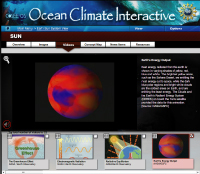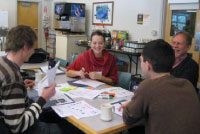Interactive Software Developed Through Iterative Feedback Processes COSEE-OS has developed a suite of multimedia tools designed to enhance the teaching of ocean and climate science. In two linked applications - the Ocean Climate Interactive (OCI) and Concept Map Builder (CMB) - concept mapping is used as a foundation for learners to make connections between fundamental concepts in ocean and climate science. Section II of this document describes how these cost-free online tools have been incrementally developed, tested, and refined over the course of a series of teacher/scientist professional development workshops to maximize their efficacy. These tools are meant to supplement their education and outreach efforts to help them more effectively reach their target audiences, and the results of post-workshop evaluations are shared in Section III. Use of both the OCI and CMB further ocean science literacy by emphasizing the connections between the ocean and climate systems, and surpass traditional concept mapping software by connecting users directly to scientific content. MORE >> (PDF, 634 KB)
Building Consensus and Understanding Through Collaboration Through the use of iterative feedback and evaluation, COSEE-OS has developed several models and processes for facilitating interactions between mixed groups of research scientists and educators, graduate students and undergraduates. These models take into account the unique needs of the groups involved to create dynamic learning environments for all participants. Specifically, COSEE-OS has designed and piloted three different workshop models and an application/matching process that can be applied to meet the needs of several different collaborative "modes" or "groupings. The three models are referred to as: I) "Peer-to-Peer" when concerning research scientists and professional educators; II) "Mentor-Mentee" when research scientists work with students with less experience (e.g., graduate students); and III) "Mixed" collaborations when there are groups containing a diversity of backgrounds and experience. COSEE-OS has developed different strategies for each of these three models, along with an innovative application/matching process used in its collaborative workshops. MORE >> (PDF, 134 KB)
Scientist Participation in Education Conferences and Venues COSEE-OS has developed a strategy to assist scientists in communicating and presenting their research stories to new audiences at venues outside their usual professional milieu. Examples where scientists have partnered with COSEE-OS include two annual conferences of the National Science Teachers Association (NSTA). These kinds of new settings provide scientists with meaningful opportunities to broaden their outreach impact. This document includes specific examples of scientist-COSEE collaborations at national educator conferences and the sustained effects those collaborations have had. MORE >> (PDF, 279 KB)
Faculty-Graduate Student Collaborative Workshop Model A key challenge in improving scientists' capacity to address "Broader Impacts" criteria is helping them communicate their research clearly and logically to others. Given the misconceptions about climate change - including a general lack of understanding of the oceans' important role - the need for involving scientists in clarifying connections within the ocean-climate system has never been more vital. Four COSEE Centers - California, Networked Ocean World (NOW), Ocean Systems, and West - have embarked on developing and testing a series of "scientist-centered" workshop models, partnering ocean research faculty with graduate students to create concept maps on ocean and climate topics. The strategies and approaches for the "Faculty-Graduate Student Collaborative" (FGSC) project are described, including: I) Using literacy as a framework; II) Applying the "Learning & Improvement Cycle" and conducting focus groups; and III) Contributing to Network priorities while meeting the needs of the Centers. MORE >> (PDF, 10.5 MB)
|







